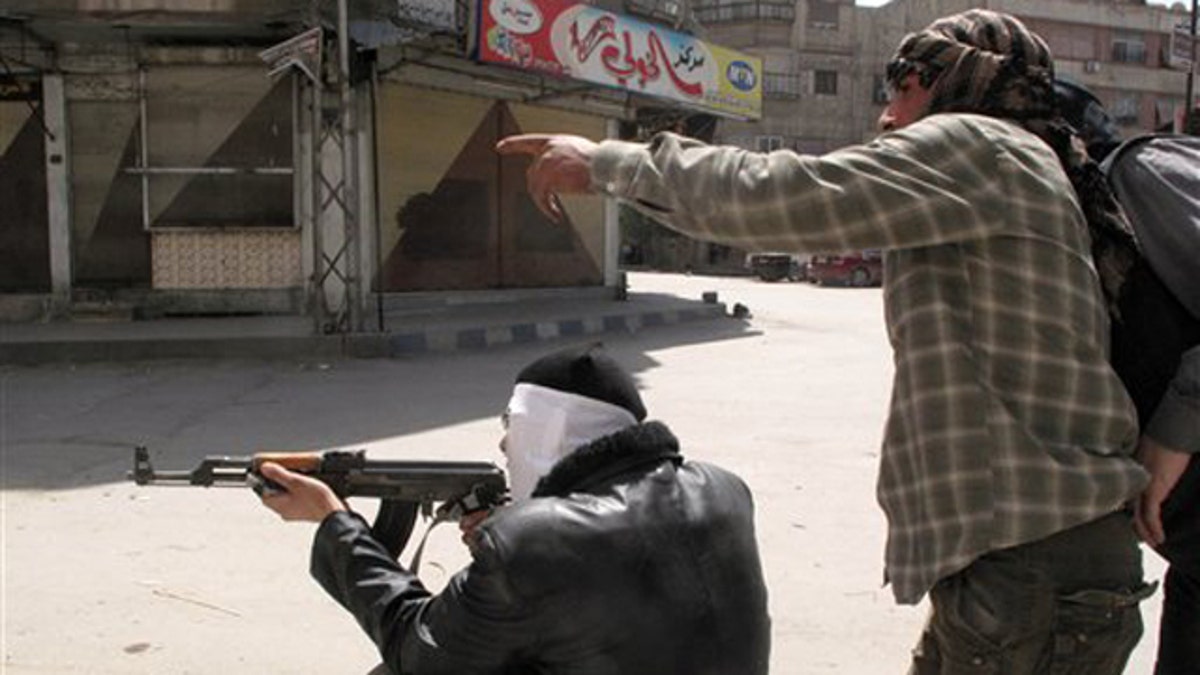
April 6, 2012: In this photo, Free Syrian Army fighters try to spot a sniper during fighting with Syrian troops in a suburb of Damascus, Syria. (AP)
BEIRUT – Syrian activists reported military attacks on two towns Tuesday, even as the government claimed its military forces have begun pulling out of some towns in compliance with a U.N.-brokered truce deal.
Syrian ally Russia said Damascus could have done better in implementing the cease-fire, which calls for troops to withdraw from towns and villages Tuesday. Syrian activists said they have seen no signs of a large-scale pullback.
The cease-fire brokered by U.N.-Arab League envoy Kofi Annan was widely seen as the last chance for diplomacy, and its collapse could push Syria even closer to an all-out civil war.
A 13-month uprising against President Bashar Assad's regime has turned increasingly militarized in response to a brutal regime crackdown. The fighting is also threatening to spill across Syria's borders, raising the risk of a regional conflagration.
Expectations of compliance by Syria had been low from the start because of previous violations of agreements and an escalation of attacks on opposition strongholds in the weeks leading up to the deadline.
Hopes dimmed further when the Damascus government made new, last-minute demands over the weekend, saying it could not withdraw troops from towns without written guarantees that the rebels would lay down their arms.
The Syrian opposition rejected the demand, saying that while it would go along with the truce, it does not recognize the Assad regime and would not issue the requested guarantees.
Under Annan's plan, the troop pullback from towns and villages was to be completed Tuesday, with all hostilities to end by 6 a.m. Thursday.
"We have already withdrawn forces and army units from several Syrian provinces," Syrian Foreign Minister Walid Moallem claimed in Moscow after talks with his Russian counterpart.
He also seemed to be raising another new demand, saying that a cease-fire must start simultaneously with the deployment of an international observer mission.
Russian Foreign Minister Sergey Lavrov said Syria's government "could have been more active and decisive" in implementing the peace plan. He also called for a speedy deployment of international observers -- including Russians -- in the country.
Lavrov also said called on the opposition to halt the violence.
The Britain-based Syrian Observatory for Human Rights, which monitors Syria, said there were no signs of a large-scale troop withdrawal, though there seemed to be a drop in attacks by Syrian forces.
The Observatory said regime troops fired shells at the town of Mariah in northwestern Syria on Tuesday. Activists also said the central city of Homs was struck by mortar rounds and that forces carried out arrests in the Damascus suburb of Harasta. Mohammed Saeed, a resident of the Damascus suburb of Douma, said tanks that routinely patrol the streets were not visible Tuesday.
Annan's deal was seen as a last-ditch effort to find a diplomatic solution to the Syrian crisis, which the U.N. says has claimed more than 9,000 lives. Unlike previous peace plans, it had the backing of Assad allies Russia and China because it did not call for the Syrian leader to step aside ahead of talks on a political transition.
Russia and China have shielded Assad from U.N. Security Council condemnation, and it was not clear whether they would now start to pressure him to comply with Annan's deal.
Options for ending the fighting appear to be dwindling, with the international community not contemplating military intervention in Syria.
Fighting in Syria has escalated in recent months, and there is a growing risk of a spillover to neighboring countries.
On Monday, Syrian forces opened fire across the Turkish and Lebanese borders, killing a TV journalist in Lebanon and wounding at least six people in a refugee camp in Turkey. Witnesses told The Associated Press that two people were killed in the shooting.
Turkish Prime Minister Recep Tayyip Erdogan on Tuesday accused Syria of violating the border and said his country is considering what steps to take in response, including measures "we don't want to think about." He did not elaborate.
Turkey, which has already given shelter to some 24,000 Syrian refugees, has floated the idea of creating security zones along its border, a step that could drag the Turkish military into the conflict.
Later Tuesday, Annan was to visit the Turkish refugee camp where Monday's shooting took place.
Refugees in the camp were skeptical about making any deals with the Syrian leader, who has gone back on his word in previous failed truce efforts.
"We believe in Kofi Annan, but Bashar Assad is not trustworthy," said refugee Dalal Fezo. "He was given 10 days to pull back his troops but he didn't."
